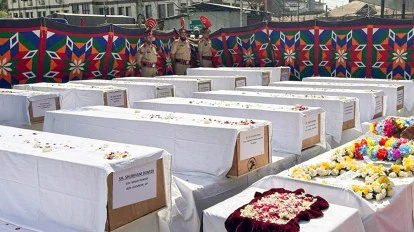
Today’s best news, in a horrific incident, the picturesque town of Pahalgam in Jammu and Kashmir has been devastated by a tragic accident. Innocent tourists who had come to enjoy the beauty of this serene destination in Pahalgam lost their lives in a brutal terrorist attack. As the bodies of the deceased were being brought back to their respective towns, heartbreaking and unbearable cries of compassion were seen, with families, friends and communities reeling in unimaginable grief. This article discusses the horrific details of the incident, the government’s response, insights into the investigation and the wider impact of this heinous act of terrorism. Stay tuned to know everything.
All the points in this post
What happened in Pahalgam?
Pahalgam, often called heaven on earth, was in chaos when a group of terrorists launched a deadly attack on unsuspecting tourists. The attack was carried out in broad daylight, leaving them with no time to escape or defend themselves. The report said the attackers targeted a popular tourist spot and spread panic among visitors. The victims included people from all walks of life – families on vacation, young couples celebrating a milestone, and solo travelers seeking solace in nature. Each victim had dreams, aspirations, and loved ones waiting at home, making the loss all the more tragic.
The brutality of the attack has shocked not only the local community but also people across the country. Videos and photos circulating online show the aftermath of the massacre, with bloodied streets and distraught survivors. For many, it is difficult to reconcile the tranquility of Pahalgam with the horror that unfolded there. The terror attack turned a joyous day into a moment of despair.
Government response and all-party meeting
In light of the tragedy, the Indian government has announced plans to hold an all-party meeting on April 24 to discuss strategies to effectively combat terrorism. Prime Minister Narendra Modi has strongly condemned the attack, vowed justice for the victims and stressed zero tolerance for terrorism. The proposed meeting is said to aim to bring together leaders of different political parties to foster unity and cooperation in these difficult times and find a solution through dialogue.
Investigation Insights
As authorities probe the circumstances surrounding the attack, initial investigations have indicated the involvement of five terrorists, three of whom are Pakistani. Intelligence agencies believe that these individuals infiltrated the region through covert channels, exploiting weaknesses in surveillance systems. The evidence points to careful planning, with intelligence operations conducted weeks before the strike.
Security experts believe that cross-border terrorism poses a persistent threat to India’s stability. The alleged involvement of foreign nationals highlights the need for increased cooperation between neighbouring countries to curb militant activities. While diplomatic channels have historically proven challenging, incidents like the Pahalgam attack have underscored the urgency of resolving long-standing disputes. At the same time, domestic law enforcement agencies must remain vigilant, ensuring that potential threats are quickly neutralized.

What is the impact on families?
For the families of the deceased, the return of their loved ones’ bodies marks the beginning of a difficult journey through grief. Parents burying children, spouses losing partners, and siblings saying goodbye forever—these scenes paint a horrifying picture of the human cost of terrorism. In small towns and villages where news spreads quickly, entire communities are offering condolences and support to the bereaved families.
One particularly heartbreaking story is that of a newlywed couple who were killed in the attack. They had gone to Pahelgam to celebrate their honeymoon, but were subjected to senseless violence. Friends describe the couple as inseparable, full of life and laughter. Now, their families are left torn apart, haunted by the memories of what could have been. Such personal narratives illustrate how indiscriminate terrorism strikes.
National and international response
Not surprisingly, the Pahelgam terror attack is said to have sparked widespread outrage in India and abroad. Political leaders from around the world have expressed solidarity with the families of the victims and condemned the perpetrators. US Secretary of State Antony Blinken issued a statement calling for accountability, while European Union officials reiterated their stance against all forms of terrorism.
Closer to home, opposition parties are reported to have joined hands with the ruling government to demand swift action. Even critics have acknowledged the gravity of the situation, putting aside party differences for the moment. Meanwhile, ordinary citizens have taken to social media platforms to express their anger and frustration. Hashtags like #JusticeForPahalgam and #EndTerrorism have trended nationwide, reflecting a collective resolve to stand united against hate and fear.
The Bigger Picture: Terrorism in Kashmir
To understand the significance of the Pahalgam attack, one must consider the larger narrative of the conflict in Kashmir. Decades of unrest have left deep scars in the region, affecting residents for generations. Despite occasional lulls, sporadic outbreaks of violence continue due to complex historical grievances and competing territorial claims.
Tourism, once a thriving industry in Kashmir, has been severely affected by repeated unrest. It now faces high risks, which has deterred many from visiting the region. As a result, businesses that rely on tourism are struggling to stay afloat. Moreover, efforts to rebuild trust and restore normalcy require sustained investment in infrastructure, education, and healthcare. Only then can Kashmir hope to regain its status as a haven of natural beauty and cultural richness.
Steps Forward: Combating Terrorism
While it is difficult to completely eradicate terrorism, incremental progress can be made through concerted efforts. First, it seems that increasing intelligence capacity is crucial. Advanced technology such as drones and satellite imagery can help monitor suspicious activity along borders and in sensitive areas. At the same time, training personnel to recognize early warning signs can help prevent attacks before they materialize.
Another important element is building international partnerships. Sharing information and resources with allies enhances preparedness and facilitates a coordinated response to emerging threats. Diplomatic engagement plays a key role here, requiring open dialogue and mutual respect despite divergent interests.
the end
The Pahelgam terrorist attack served as a poignant reminder of the fragility of peace and the enduring threat of terrorism. Yet, amidst the sorrow and devastation, we witnessed extraordinary displays of courage and compassion. From grieving families finding the strength of unity to strangers showing kindness in dark moments, humanity shines brightly in the face of adversity.
As we honor the memories of those lost, let us direct our collective energies toward building a safer, more harmonious world. Supporting affected families financially and emotionally, advocating for policy reform, and promoting dialogue on division are practical ways to make a positive contribution. Together, we can turn tragedy into victory, proving that love ultimately triumphs over hate. Let us know what you think in the comments?







